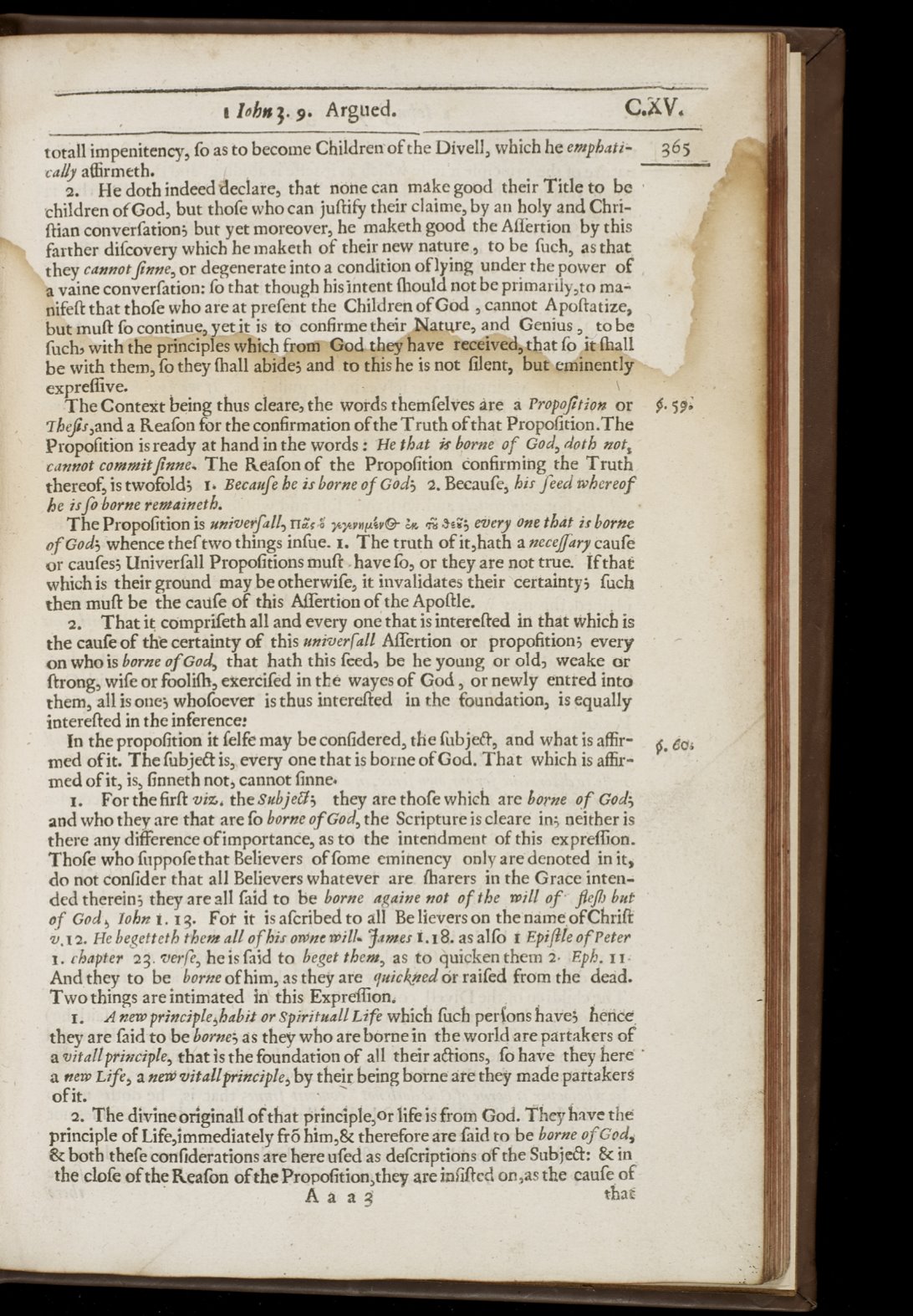

t
labs;.
9. Argued.
C.XV.
totall impenitenry,
fo
as
to
become
Children'ofthe Divell,
which he emphati-
365
call)
adirmeth.
2.
He doth
indeedAcetate,
that
none
can
makegood
their
Title to
be
children
of
God,
but
thofe who can
juftify
their
claim;
by an holy
and Chri-
Man
converfation;
but
yet moreover, he maketh good the
Affertion
by this
farther difcovery
which
hemaketh
of
their
new
nature,
to
be
fuch,
as
that
they
cannot
fnne,
or degenerate into
a
condition
of
lying
under
the power
of
a vaine converfation:
fo
that
though
his
intent
fhould not be primarily,to ma-
nifeft
that
thofe
who
are at prefent
the Children
of
God
,
cannot Apoftatize,
but
muff
fo
continue,
yet it
is
to
confirme
their
Nature,
and
Genius
, to be
fuch,
with the
principles which from
God they have received,
that
fo
it
shall
be
with
them,
fo
they
Ihall
abide; and
to
this he
is
not
filent,
but eminently
exprefiive.
The
Context
being thus cleare,
the
words themfelves
ire
a
Propofition
or
¢.
qqè.
Thefts
,and
a Reafon for
the
confirmation
of
the
Truth
of
that
Propofition.The
Propofition
is
ready at hand
in
the
words
:
He
that
is borne
of
God,
loth
not,
cannot
commit
'bane.
The
Reafon
of
the
Propofition confirming the
Truth
.
thereof,
is
twofold; r.
Becaufe he
is
borne
of
God;
2.
Becaufe, his
feed
whereof
he
is
fo
borne
remaineth.
The
Propofition
is
nniverfall,
nás-o
3e14vnµtvg
r"e
9eß;
every one
that
is
borne
of
God;
whence
theftwo
things infue.
r.
The truth of
it,hath
a
neceffary
caufe
or
caufes;
Univerfail Propofitions
muff
.
have fo,
or
they are
not
true.
If
that
which
is
their
ground
may
be
otherwife,
it
invalidates
their 'certainty;
fuch
then
mutt
be the
caufe
of
this Affertion
of
the
Apoftle.
2.
That it
comprifeth
all
and
every
one
that
is
interefted
in
that
which
is
the
caufe
of
the certainty
of
this univerfall Affertion
or
propofition; every
on
who
is borne
of
God,
that
hath
this feed, be
he young
or old,
weake
or
ftrong,
wife
or
foolifh, exercifed
in
the
wayes
of
God
,
or
newly
entred
into
them, all
is
one; whofoever
is
thus interefted
in
the foundation,
is
equally
interefted
in
the
inferences
In
the
propofition
it
felfe
may be confrdered,
the
fubje&,
and what
is
affir-
6,
F
.,
medof
it.
The
fubje&
is,
.every one
that
is
borne
of
God.
'That
which
is
affir-
med
of
it,
is,
finneth
not, cannot
finne.
a.
For the
firff
viz.,
the
subject;
they are thofe
which
are
borne
of
God;
and who they are
that
are
fo borne
of
God,
the
Scripture
is
cleare
in
neither
is
there
any difference
ofimportance,
as
to
the intendment of
this
expreflion.
Thofe who
fuppofethat
Believers
offome
eminency only
are
denoted
in
it,
do not
confider
that
all
Believers
whatever are
fharers in the
Grace
inten-
ded therein; they are
all faid
to be
borne
againe not
of
the
will
of
fiefb
but
of
God, lohn
1.
13.
For
it
is
afcribed
to
all
Believers on
the
name ofChrift
v, r
2. He
begetteth them
all
of
his
ozone
will.
games
r.18.
as
alto
r
Epi
file
o
f
Peter
r.
chapter 23. verfe,
he
is
laid
to
beget
them,
as
to
quicken them
2
Kph..
r
r:
And
they
to
be
borne
of
him,
as
they are
quicltned
ór railed from the dead.
Two
things are
intimated in this
Expreflion,
T.
A new
principle,habil
or
spirituall
Life which
fuck
perfons
have; hence
they are
faid
to
be
borne'
as
they who are borne
in
the
world
are partakers
of
a vitaliprinciple,
that
is
the
foundation
of
all
their
a
&ions, fo
have they here
a
new
Life, a
new
vitallprinciple, by
their
being
borne are
they made
partakers
of
it.
2.
The divineoriginall
of
that
principle,or
life
is
from God.
They have
the
principle of Life,immediatelyfrô him,& therefore are
faid
to be
borne
of
God,
&both
thefe confiderations are here ufed
as
defcriptions
of
the
Subje&:
&
in
the
chafe
of
the Reafon
of
the
Propofition,they are
infiffed
on,as the
caufe
of
Aa
a
that










